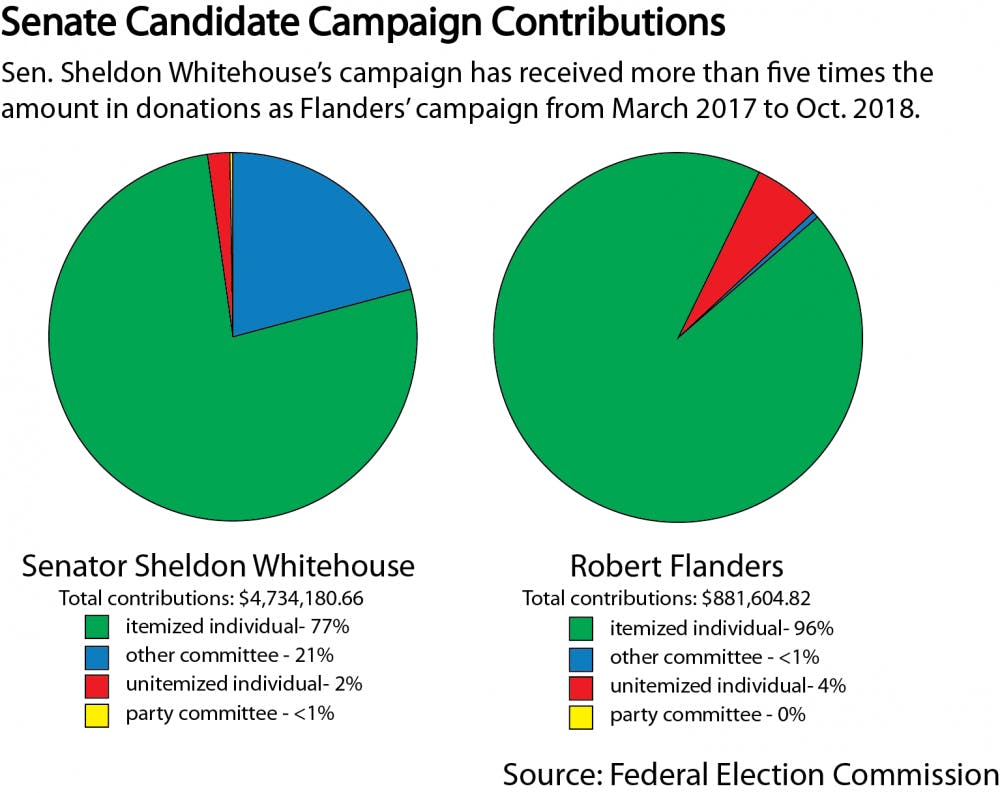On Nov. 6, incumbent Sen. Sheldon Whitehouse, D-R.I., will face off against Republican and former Rhode Island Supreme Court Justice Robert Flanders ’71 in the Rhode Island Senate midterm elections. Rhode Islanders strongly favor Whitehouse, according to a recent WPRI poll that had Whitehouse 19 points ahead of Flanders.
The candidates differ on many key issues including climate change, Supreme Court Justice Brett Kavanaugh’s confirmation and approval of President Trump and his administration. Whitehouse is known as a “climate champion,” according to the Rhode Island chapter of the Sunrise Movement, an environmental activism group, but Flanders calls him a “global alarmist.”
Over the course of his 12 years in office, Whitehouse has made climate change a top priority, taking to the Senate floor every week to discuss global warming, according to a Mashable article published in March 2018. He authored the American Opportunity Carbon Fee Act, which would instate a national carbon fee whose proceeds would go back to U.S. citizens. Whitehouse introduced a second version of the act to the Senate in February 2018 and it was referred to the Committee on Finance. Since then, a carbon tax has received bipartisan support. Following this proposal, “prominent Republicans who are serious about solving the challenge of climate change have endorsed a revenue-neutral carbon fee like the one I’ve proposed,” Whitehouse wrote in an email to The Herald.
But not all environmental activists believe that Whitehouse is doing enough to address climate change. He is still “set in this establishment mindset,” said Sunrise R.I.’s Hub Coordinator Lauren Maunus ’19, adding that she wishes he would publicly oppose natural gas projects and refuse funding from fossil fuel companies. The group has criticized Whitehouse for refusing to sign the No Fossil Fuel Money Pledge, which asks signatories to commit to adopting “a policy to not knowingly accept any contributions over $200 from the PACs, executives or front groups” of oil, gas or coal companies, the pledge states. Sen. Bernie Sanders, I-V.T., New York congressional candidate Alexandria Ocasio-Cortez and candidates for Rhode Island State Senate Melissa Murray and Bridget Valverde, among others, have signed the pledge.
In April 2018, Whitehouse voted against confirming vocal climate change denier Mike Pompeo as Secretary of State, though initially he refused to publicly oppose Pompeo's nomination. Pompeo has also accepted numerous campaign donations from the Koch brothers, Maunus said.
In contrast to Whitehouse, Flanders prefers that private businesses, as opposed to government actors, address climate change. “I have great faith in our private enterprise and I’d rather let them do their best,” Flanders told The Herald. He criticized Whitehouse’s prioritization of the issue, and while he admitted that it is important to “work around potential effects of climate change,” the United States will still need to “depend on fossil fuels for the foreseeable future,” Flanders said.
The candidates are also at odds when it comes to Kavanaugh, as Flanders sharply criticized Whitehouse’s contributions to Kavanaugh’s confirmation hearing for being too partisan.
Whitehouse decided to vote against confirming Kavanaugh after the first Senate Judiciary Committee hearing, The Herald previously reported. “The biggest factor for me is the array of indicators that he would be a highly partisan Supreme Court judge,” Whitehouse said in a previous interview with The Herald.
During the hearing, Whitehouse called attention to Kavanaugh’s high school yearbook, reading out loud snippets from Kavanaugh’s personal page referencing beer and “flatulence.”
“I thought his performance was abysmal,” Flanders said, adding that Whitehouse’s use of Kavanaugh’s high school yearbook writings was an “exercise in character assassination and personal attack.” In the end, while Whitehouse voted against Kavanaugh’s confirmation, Flanders remains in support of the judge. Flanders said that the allegations against Kavanaugh from Christine Blasey Ford “were completely unsubstantiated and not corroborated by even the people that the accuser said were there.”
Neither candidate is a big supporter of Trump, but while Whitehouse ardently opposes the president on most key issues, Flanders is more closely aligned with some of the administration’s policies. In an email to The Herald, Whitehouse pledged to protect “our shared American values from President Trump’s attacks” and wrote that “the battles ahead are going to have enormous consequences for the generation that’s just coming of age” with Trump as president.
Flanders said he would not hesitate to oppose Trump, but “when he does things that are good for the country and Rhode Island I’ll support him.” Flanders criticized Trump’s choice to separate families at the U.S.-Mexico border, his meeting with Russian President Vladimir Putin and his “across the board tariff raises,” he said. But on issues such as immigration and gun control, Flanders is more aligned with the Trump administration. He warned against the “caravan of thousands of Central Americans trying to storm our borders” and generally emphasizes border security as a key priority. Flanders favors “beefing up security” rather than imposing a ban on assault weapons and is not in favor of doing anything “that would potentially be in violation of the Second Amendment,” he said. Flanders believes that rather than looking to Congress to pass legislation, the country should improve security in places like schools and other communal areas, he added.
Since March 2017, Whitehouse’s campign has raised $4.7 million compared to the Flanders campaign’s $881,000, according to Federal Election Commission data. Flanders’ donors are made up of mostly private individuals, while Whitehouse has received funds from technology companies, labor unions, military contractors and energy companies, including National Grid.
Correction: A previous version of this article stated that in April 2018, Whitehouse voted to confirm vocal climate change denier Mike Pompeo as Secretary of State. In fact, Whitehouse initially refused to publicly oppose Pompeo but did eventually vote against confirming him. The Herald regrets the error.





